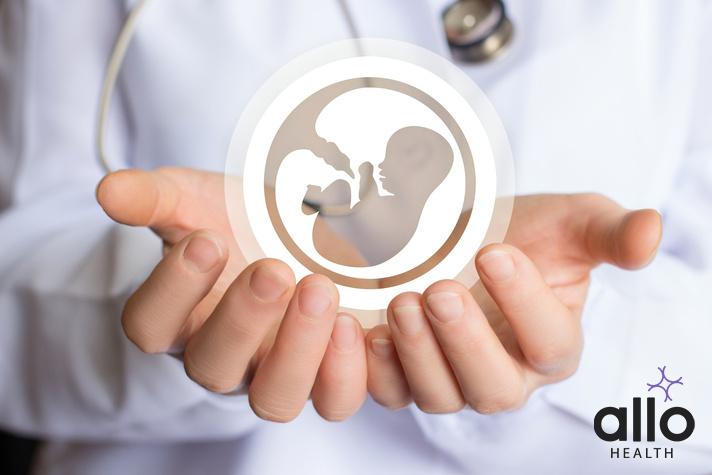A Guide To A Successful Sex Night Before Embryo Transfer

Allo Health is dedicated to personalized well-being, offering support and trusted information tailored to individual health goals. The platform emphasizes human-generated content, led by a distinguished medical team of experts, including physicians and sexual health specialists. Their commitment to credibility involves rigorous fact-checking, authoritative research, and continuous updates to ensure accurate, up-to-date information. Allo Health's unique approach goes beyond conventional platforms, providing expert-led insights and a continuous commitment to excellence, with user feedback playing a crucial role in shaping the platform's authoritative voice.

Dr. Warisha holds an MBBS degree from GMERS Medical College, Ahmedabad. She has an in depth experience on sexual and reproductive health and rights.
Why This Was Upated?
Our experts continually monitor the health and wellness space, and we update our articles when new information became available.
Updated on 31 August, 2023
- Article was updated as part of our commitment to diversity, equity, and inclusion.

"The following blog article may discuss medical treatments and interventions. However, it is important to note that the information provided is for general educational purposes only and should not be considered as a substitute for professional medical advice, diagnosis, or treatment. Always seek the guidance of a qualified healthcare professional for personalized medical advice.
Book consultation
Medical treatments are complex and should be tailored to individual circumstances. The information presented in this blog may not be applicable to everyone, as each person's medical condition, history, and needs are unique. Only a qualified healthcare professional can evaluate your specific medical situation, consider relevant factors, and provide appropriate recommendations for diagnosis, treatment options, and monitoring.
It is crucial to note that self-diagnosis, self-medication, or relying solely on the information provided in this blog for treatment decisions can have serious health consequences. "
When it comes to starting a family, the journey to conception can be a challenging one. For couples who take the route of in-vitro fertilization, knowing how to optimize their chances of success is critical. One of the key factors in a successful embryo transfer is the preparation that happens the night before.
What Is An Embryo Transfer?
Embryo transfer is a medical procedure commonly used in assisted reproductive technology (ART) to help individuals and couples achieve pregnancy. It is a crucial step in in vitro fertilization (IVF) and other similar treatments. The process involves transferring embryos that have been created through in vitro fertilization into the uterus of a woman, where they have the potential to implant and develop into a pregnancy.
Here’s a detailed breakdown of the embryo transfer procedure:
- Ovulation Induction: Before the embryo transfer can take place, the woman typically undergoes a series of hormonal treatments to stimulate her ovaries to produce multiple mature eggs. This is done to increase the chances of obtaining viable embryos for fertilization.
- Egg Retrieval: Once the eggs are deemed mature, a minor surgical procedure known as egg retrieval or follicular aspiration is performed. A thin needle is inserted through the vaginal wall into the ovaries to retrieve the eggs. This procedure is usually done under sedation or anesthesia.
- Fertilization: The retrieved eggs are then combined with sperm in a laboratory dish for fertilization. This can occur through conventional insemination, where the sperm is placed in close proximity to the eggs, or through intracytoplasmic sperm injection (ICSI), where a single sperm is directly injected into each egg.
- Embryo Culture: After fertilization, the resulting embryos are cultured in a controlled environment for a few days, typically 3 to 5 days, during which they undergo cell division and development.
- Embryo Selection: During the culture period, the embryologists closely monitor the embryos for their development and quality. Based on certain criteria, such as the number of cells, symmetry, and appearance, the healthiest embryos are selected for transfer.
- Preparation for Transfer: Prior to the embryo transfer, the woman’s uterus is prepared to create an optimal environment for embryo implantation. This may involve taking hormonal medications like estrogen and progesterone to thicken the uterine lining.
- Embryo Transfer: The selected embryos are loaded into a thin, flexible catheter. The woman lies on an examination table, similar to a pelvic exam, and the catheter is inserted through the cervix and into the uterus. Using ultrasound guidance, the embryologist or fertility specialist carefully guides the catheter to the desired location within the uterus and gently releases the embryos.
- Post-Transfer Care: After the transfer, the woman is usually advised to rest for a short period before being allowed to resume her normal activities. She may continue taking hormonal medications to support the uterine lining and create a favorable environment for embryo implantation.
- Pregnancy Test: About 10-14 days after the embryo transfer, a pregnancy test is performed to determine whether the procedure was successful. If one or more embryos successfully implanted, the woman will test positive for pregnancy.
The success of embryo transfer can vary depending on factors such as the woman’s age, the quality of the embryos, and any underlying fertility concerns. Multiple embryo transfers may be required to achieve a successful pregnancy in some cases.
Why Sex Before Embryo Transfer Matters
Engaging in sexual activity before an embryo transfer is a topic that has been discussed in the context of assisted reproductive technology (ART), particularly in vitro fertilization (IVF) cycles. While there isn’t a universal consensus on this matter, some fertility clinics and specialists may provide guidelines regarding sexual activity before embryo transfer. Here’s a detailed look at why sex before embryo transfer might be addressed and some of the reasons behind the recommendations:
- Minimizing Risk of Infection: One of the primary concerns when discussing sexual activity before embryo transfer is the risk of introducing bacteria or infections into the vaginal and uterine environment. During embryo transfer, the cervix is slightly open to allow the catheter to pass through, potentially increasing the risk of introducing harmful microorganisms. Infections could potentially interfere with the implantation process or even harm the developing embryo.
- Maintaining Uterine Environment: Some fertility specialists may recommend abstaining from sexual intercourse to maintain the uterine environment in the days leading up to the embryo transfer. They believe that sexual activity could potentially alter the uterine environment, affecting factors such as cervical mucus consistency or hormonal balance, which might impact the success of implantation.
- Reducing Physical Discomfort: Engaging in sexual intercourse might lead to physical discomfort for some women, especially in cases where the ovaries are enlarged due to the hormonal stimulation used in IVF cycles. These enlarged ovaries can cause discomfort or even mild pain during sexual activity.
- Psychological and Emotional Factors: The time leading up to an embryo transfer can be emotionally charged for individuals and couples undergoing fertility treatments. Some specialists might recommend abstaining from sexual activity to help alleviate any added stress or emotional pressure that could arise from concerns about sexual activity affecting the embryo transfer’s success.
- Clinic and Physician Policies: Some fertility clinics may have standardized protocols that recommend abstaining from sexual activity before embryo transfer. These guidelines might be in place to ensure consistent practices among patients and to minimize any potential risks that sexual activity could pose.
Guidelines regarding sexual activity before embryo transfer can vary from one fertility clinic to another, and even among different physicians within the same clinic. Patients are advised to discuss this topic directly with their fertility specialist or medical team to receive personalized recommendations based on their individual situation.
Sex Night Before Embryo Transfer
The topic of engaging in sexual activity the night before an embryo transfer is a subject of debate and can vary based on individual clinic policies and medical recommendations. Some fertility clinics may provide specific guidelines while others might leave the decision to the discretion of the patients and their healthcare providers. Here’s a detailed look at the factors to consider when discussing whether to have sex the night before an embryo transfer:
- Infection Risk: One of the primary concerns associated with having sex before an embryo transfer is the potential risk of introducing bacteria or infections into the vaginal and uterine environment. During an embryo transfer, the cervix is slightly open to allow for the passage of the catheter. Engaging in sexual activity could theoretically increase the risk of introducing harmful microorganisms, which might interfere with implantation or harm the developing embryo.
- Uterine Environment: Some fertility specialists might recommend abstaining from sexual activity to maintain the uterine environment in the days leading up to the embryo transfer. This recommendation is based on the belief that sexual activity could potentially alter factors such as cervical mucus consistency or hormonal balance, which might influence the success of implantation.
- Sperm Quality: If the male partner’s sperm is being used for fertilization (rather than using donor sperm or frozen sperm), some clinics might suggest abstaining from sexual intercourse to ensure that the highest quality sperm are available for the IVF procedure. Sperm produced in the days leading up to the embryo transfer are unlikely to affect the sperm used for fertilization.
- Physical Comfort: Some women might experience physical discomfort during sexual intercourse, especially if they are undergoing IVF and their ovaries are enlarged due to hormonal stimulation. Enlarged ovaries can cause discomfort or mild pain during sexual activity, making it less desirable for some patients.
- Psychological and Emotional Factors: The days leading up to an embryo transfer can be emotionally stressful for individuals and couples undergoing fertility treatments. Some specialists might recommend abstaining from sexual activity to alleviate any additional stress or emotional pressure that could arise from concerns about sexual activity affecting the embryo transfer’s success.
- Clinic and Physician Policies: Some fertility clinics might have standardized protocols that recommend abstaining from sexual activity before embryo transfer. These guidelines are intended to ensure consistent practices among patients and to minimize any potential risks that sexual activity could pose.
- Individual Preferences: Ultimately, the decision to have sex the night before an embryo transfer should take into account the preferences and comfort level of both partners. Some couples might feel that engaging in sexual activity is an important part of their relationship, and they may choose to do so despite any potential concerns.
Have open communication with the healthcare provider or fertility specialist involved in the treatment. They can provide personalized recommendations based on the patient’s medical history, the specific details of the IVF cycle, and the clinic’s policies. Patients should feel comfortable asking questions and expressing their concerns to make an informed decision that aligns with their needs and the recommendations of their medical team.
Frequently Asked Questions
(1) Can I have sex the night before my embryo transfer?
It’s generally recommended to abstain from sexual activity the night before your embryo transfer. This is because engaging in sexual intercourse can introduce bacteria into the vaginal and uterine environment, potentially affecting the implantation process.
(2) Why is there concern about having sex before embryo transfer?
Having sex before embryo transfer could introduce infections or bacteria into the uterus, where the embryo will be placed. This might impact implantation or harm the developing embryo.
(3) Could sex affect the quality of the sperm used for fertilization?
If the male partner’s sperm is being used for fertilization, it’s unlikely that having sex the night before will significantly affect sperm quality. Using high-quality sperm is important, so some clinics recommend abstaining to ensure optimal sperm for the procedure.
(4) How does sex impact the uterine environment?
Some fertility specialists believe that sexual activity could potentially alter factors like cervical mucus consistency or hormonal balance, which could influence the success of embryo implantation.
(5) What about discomfort due to enlarged ovaries?
Enlarged ovaries, a common result of hormonal stimulation in IVF, might cause discomfort during sex. If you’re experiencing discomfort, it might be best to avoid sexual activity to prevent additional discomfort.
(6) Is it about psychological factors too?
Yes, the days leading up to embryo transfer can be emotionally stressful. Abstaining from sex might help alleviate the added stress or emotional pressure related to concerns about how sex might affect the outcome.
(7) Are there clinic-specific policies?
Yes, different fertility clinics have different policies. Some might recommend abstaining to minimize potential risks, while others might leave the decision to you and your partner.
(8) Does having sex increase chances of getting pregnant?
While having sex can lead to pregnancy naturally, the embryo transfer process is carefully controlled. The focus is on the prepared uterine environment and the quality of embryos being transferred.
(9) How can I decide what’s best for me?
Talk to your fertility specialist. They can provide guidance based on your unique situation and the specific details of your treatment plan.
(10) What if I want to have sex?
Ultimately, the decision is yours. If you and your partner want to have sex, discuss it with your fertility specialist. They can help you make an informed decision that aligns with your needs and treatment goals.





































